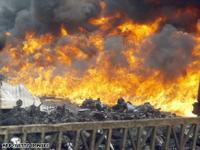 19 June 2008
19 June 2008
Oil company Royal Dutch Shell says it has temporarily stopped production at its main offshore oilfield in Nigeria, following a militant attack.
The raid took place overnight on the Bonga oil platform about 120km (75 miles) off the coast of the Niger Delta, the company said.
It is the first attack on the oilfield, which normally produces about 200,000 barrels a day.
Attacks on the inshore Niger Delta have helped drive up world oil prices.
Nigeria’s valuable offshore oilfields had always been considered difficult for most militants to target, the BBC’s Alex Last reports from Lagos.
But early on Thursday gunmen in boats reached the Bonga installation, Shell’s flagship project, for the first time.
A Nigerian navy spokesman confirmed reports that militants had kidnapped a US oil worker from a separate vessel on their way back from the raid.
The Movement for the Emancipation of the Niger Delta (Mend) claimed it carried out the attack in an email sent to journalists, and named the American as Captain Jack Stone.
They said he would be released “in the coming hours”.
Sophisticated
The gunmen failed to get inside the platform, but attacked a key vessel used for production storage and offloading, a Shell spokesman said.
Several people were reported to have been injured.
Mend says it is campaigning for a greater share of the region’s oil wealth to be kept by local people, but the government says they are criminals motivated by the ransoms they receive from oil companies.
The shutdown has cut a tenth of Nigeria’s total output in one go.
This comes on top of a reduction of at least 20% in recent years following inland attacks.
Our correspondent says Bonga was new, expensive and working well despite the difficulties and repeated attacks affecting the company’s inshore operations in the Delta.
The militants in the Delta are getting more sophisticated and better equipped and armed, he says.
Now they have proven that in terms of distance at least, all of Nigeria’s facilities are within their reach.
Amnesties promised
Next month, a peace summit organised by the government on the Niger Delta unrest is due to begin in the capital, Abuja.
The government has promised amnesties to any militants who take part.
Mend has refused to attend unless Henry Okah, one of their leaders currently on trial for treason and gun-running, is also granted amnesty.
But the government has refused.
“We want everyone to be there to air their grievances,” vice-presidential aide Akilu Indabawa told the BBC’s Hausa Service.
“But in Henry Okah’s case the issue is in front of a court and the government can’t intervene because it respects the rule of law.”
Other reports to balance this –
Nigerian militants demand government accept mediation by ex-US president Carter
Movement for the Emancipation of the Niger Delta Declares War
Nigerian militants: We killed drunken soldiers
—–
21st June 2008
Nigeria oil pipeline ‘attacked’
US oil giant Chevron has halted onshore oil production at its Escravos oilfield after an attack on a pipeline.
The loss could equate to about 120,000 barrels per day, about 6.6% of Nigeria’s total daily crude production.
The Nigerian military said militants blew up the Niger Delta pipeline, but the region’s main armed group blamed angry youths for the attack.
Earlier this week, Nigeria’s president ordered tighter security in the Delta after an attack at a Shell facility.
According to the BBC’s Alex Last, in Lagos, sources in the western Niger Delta believe the latest attack is the work of illegal oil “bunkerers” – involved in the lucrative trade in stolen oil.
Significant loss
The earlier attack on Shell’s floating oil platform at Bonga, which cut a tenth of Nigerian oil production in one go, was carried out by militant group the Movement for the Emancipation of the Niger Delta (Mend).
News agencies quoted Mend as saying that it was not responsible for the Escravos incident, which occurred on Thursday night.
Mend said it had been contacted by angry youths who reported having blown up the pipeline, the Associated Press said.
The Escravos incident highlights the vulnerability of the oil infrastructure in Nigeria, our correspondent says.
With the government planning to hold a big summit of Niger Delta leaders and more money expected to flow to the Niger Delta, perhaps the armed groups there feel it is a good time to show how relevant they are to any chance of peace, our correspondent adds.
While the loss to Nigerian crude output is significant, it is a small fraction of the daily global oil output, of about 85 million barrels per day.
News of the Escravos attack comes ahead of a meeting in Jeddah, Saudi Arabia, of major energy producers and users – where the rising price of oil will be the key topic for discussion.
On Friday the Nigerian government announced how it would spend a $10bn (£5bn) windfall from the rising oil price.
It will spend just over $5bn fixing the country’s power supply and the rest will be shared among the 36 state governments.
